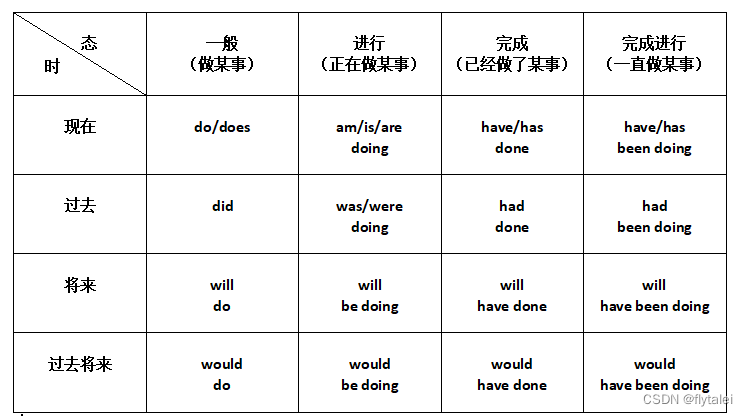思考:汉语和英语是靠什么来说明时态的
动词变化表
| 原形 | 三单 | 现在分词 | 过去式 | 过去分词 |
|---|---|---|---|---|
| be | is | being | was/were | been |
| do | does | doing | did | done |
| have | has | having | had | had |
| take | takes | taking | took | taken |
| make | makes | making | made | made |
| drive | drives | driving | drove | driven |
| steal | steals | stealing | stole | stolen |
| wear | wears | wearing | wore | worn |
汉语和英语关于时态的区别
| 汉语 | 英语 |
|---|---|
| 1.人们采取行动。(一般状态) | People take actions.(动词,注意动词的变化) |
| 2.人们正在采取行动。(正在进行) | People are taking actions.(be+动词ing) |
| 3.人们已经采取行动了。(已经干嘛了) | People have taken actions.(have+ 动词的过去分词) |
| 4.人们还在采取行动。(已经干嘛了,但是在干) | People have been taking actions.(have+been+动词ing) |
现在的状态
1.我打扫房间了。 I clean the room.
2.我在打扫房间。 I am cleaning the room.
3.我已经打扫房间了。 I have cleaned the room.
4.我还在打扫房间。 I have been cleaning the room.
注意:助动词是谓语的一部分
用被动语态翻译下列句子
| 1.我打扫房间。 (do) | The room is cleaned by me. |
|---|---|
| 2.我正在打扫房间。(be doing) | The room is being cleaned by me. |
| 3.我打扫了房间。(have done) | The room has been cleaned by me. |
| 4.我还在打扫房间。(have been doing) | The room has been being cleaned by me. |
注意被动语态的变形是“be+动词ed+by”,那么此时这里的“be cleaned”就是一个整体,变形时只需要关注be的变化
时态变化表
用do代表动词:dose(三单) doing(现在分词) did(过去式) done(过去分词)

被动语态的时态变化表

用否定形式翻译下列句子
否定形式变换的两种形式:
1.假如有助动词,直接在助动词后面加not。
2.假如只有实义动词,没有助动词,那就在实义动词的前面加上一个助动词
1.小明吃过饭了。(have + done) have a meal
Ming has had a meal.
Ming has not had a meal.
2.他经常周末打游戏。
He plays games on weekends.
He does not play games on weekends.(dose已经承担了第三人称单数,所以play不用加s,靠近人称的那个动词承担第三人称单数)
3.他爸爸还在看电视。
His father has been watching TV.
His father has not been watching TV.
4.她妈妈正在洗碗。
Her mother is washing the dishes.
Her mother is not washing the dishes.
课后练习,根据提示完成时态填空
1.I "am playing" games with my phone.(生在玩)
2.She "dose not run" in the morning.(不跑步)
3.Mary and Jenny "are watching" TV.(正在看)
4.The water "has been used up".(已经耗尽了)
5.His father "has slept" for 2 hours.(已经睡了)
6.It is 5 o'clock.The baby "is sleeping".(睡觉)
7.The experiment "is finished".(还没完成)
8.The poor boy "has been doing" his homework.(还在做)
9.This beautiful lady "has been married" since 1997.(已经结婚)
10.I "live" in Guangdong.(住)
1.我经常在早上起床。
I always get up in the morning.
2.10点了,Jack还在看电视。
It is 10 o'clock, Jack has been watching TV.
3.小红已经写了2个小时的作业了。 (writes--writing--wrote--written(过去分词))
Hong has been writing her homework for 2 hours.
4.小明一直在玩电脑游戏。
Ming has been playing computer games.
5.他们的领导还没有结束会议。
Their leaders have not concluded the meetting.
6.我们的任务还没有完成。
Our task has not been finished.
过去的状态
1.我打扫房间。 I "cleaned" the room.
2.我在打扫房间。 I "was" cleaning the room.
3.我已经打扫房间了。 I "had" cleaned the room.
4.我一直在打扫房间。 I "had" been cleaning the room.
将来的状态
will = be going to (后面都是直接加动词原形)
1.我打扫房间。 I will clean the room.
2.我正在打扫房间。 I will be cleaning the room.
3.我已经打扫房间了。 I will have cleaned the room.
4.我一直在打扫房间。 I will have been cleaning the room.
过去将来
1.我打扫房间。 I would clean the room.
2.我正在打扫房间。 I would be cleaning the room.
3.我已经打扫房间了。 I would have cleaned the room.
4.我一直在打扫房间。 I would have been cleaning the room.
时态总结表

一般现在时:I do my homework.
一般将来时:I will do my homework.
一般过去时:I did my homework.
现在进行时:I am doing my homework.
现在完成时:I have done my homework.
过去进行时:I was doing my homework.
过去将来时:I would do my homework.
过去完成时:I had done my homework.
时态在考试中的应用
1.The measure has been carried out by the authorities. (carry out:实施)
政府实施了这项措施。(be + 动态ed + by 表被动)
2.We will have been listening to the professor.
3.He is going to make an introduction to you about books.
4.All the fragments have been being put together to get the truth.
为了寻求真相,所有的碎片都被拼凑在了一起。
put(原形)--> puts(三单) --> puts(复数)--> putting(现在分词) --> put(过去式)-->put(过去分词)
5.These plants will have been watered when we arrive.
water做名词时时水的意思,water做动词有浇水的意思。
课后作业
1.我已经完成作业了。
I have finished my homework.
2.昨晚新闻开播的时候,我已经完成作业了。
I had finished my homework when the news came on last night.
3.待会妈妈回来,我已经完成作业了。当妈妈回来的时候
I will have finished my homework when mother comes back.
根据提示完成填空,并改成否定
1.Tommorrow he "will have" supper at school.(have)
Tommorrow he "will not have" supper at school.
2.Ming "bought" some apples yesterday.(buy)
Ming "did not bought" some apples yesterday.
3.They "do" their homework every day.(do)
They "do not" their homework every day.
4.When I arrived at the airport,my dad "had left".(left)
When I arrived at the airport,my dad "had not left".
5.Mary "was attending" a meeting at 8 o'clock yesterday.(参加)
Mary "was not attending" a meeting at 8 o'clock yesterday.